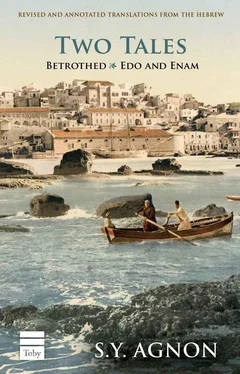Jeffrey Saks
Editor, The S.Y. Agnon Library
The Toby Press
Tisha B’Av 5774 (Agnon’s 126 th birthday)
Jaffa view from Hôtel du Parc.
I

JAFFA IS THE DARLING OF THE WATERS: THE WAVES of the Great Sea kiss her shores, a blue sky is her daily cover, she brims with every kind of people, Jews and Ishmaelites and Christians, busy at trade, at shipping and labor. But there are others in Jaffa who take no part in any of these: teachers, for instance, and such a one was Jacob Rechnitz, something of whose story we are about to tell.
When Jacob Rechnitz had completed his term of study and been crowned with a doctorate, he joined a group of travelers going up to the Holy Land. He saw the land and it was good, and those that dwelt within it, they were tranquil and serene. And he said to himself, If only I could earn my bread here, I should settle in this land. Jaffa was his dearest love, for she lay at the lips of the sea, and Rechnitz had always devoted himself to all that grows in the sea. He happened to visit a school, and that school needed a teacher of Latin and German. The authorities saw him, deliberated on him; they offered him a post as teacher, and he accepted.
Now Rechnitz was a botanist by profession and expert in the natural sciences. But as the natural sciences were already in the hands of another teacher, while the post of Latin and German was vacant, it was this post that was assigned him. For sometimes it is not the position that makes the man, but the man who makes the position, though it must also be said that Rechnitz was a suitable choice.
So Rechnitz set to work. He met his duties faithfully. He chose the right books and did not weigh his students down with tedious topics. He was never bitter with his students; never too proud with his fellow teachers, most of whom were self-taught. His students loved him, his colleagues accepted him. His students, because he treated them as friends; his colleagues, because he allowed them to treat him as one. And, too, his tall bearing and deep voice, his manners and his chestnut eyes that looked with affection on everyone, gained him the love of all. Not more than a month or two had passed before he had won a good name in the town. Not more than a month or two before he had become a favorite guest of fathers whose daughters had come to know him before the fathers themselves.
The fever of land speculation had already passed. The money-chasers, who had sought to profit from the soil of Israel, had gone bankrupt and cleared out. Jaffa now belonged to those who knew that this land is unlike all others; she yields herself only to those honest workers who labor with her. Some engaged in trade and some in the skills of which the land had need; others lived on the funds they had brought from abroad. Nor one nor the other asked too much of life. They left the Turk to his seat of power and sought protection in the shade of the foreign consulates, which looked on them more kindly than had the lands of their birth. The dreamers awoke from their dreams, and men of deeds began to dream dreams of a spiritual center and a land of Israel belonging to Israel. From time to time they would gather and argue about the country and its community, and send reports of their proceedings to the Council of the Lovers of Zion in Odessa. And all the while, each man was father to his sons and daughters, and husband to his wife, and friend to his friends.
Life was unexacting, very little happened. The days slipped by quietly, people were undemanding. Their needs were limited and easily satisfied. The well-to-do were content to live in small dwellings, to wear simple clothes and to eat modestly. A man would rise early in the morning, drink his glass of tea and take a few olives or some vegetables with his bread, work until lunch time and come home before dusk. By then the samovar was steaming, neighbors paid calls, tea and preserves were handed round. If some learned man were present, he would make fun of the hotel-keeper who had misunderstood a Talmudic word, and called fruit preserves “jam.” Or if a farmer were in the company, his conversation would be about the uprooting of vines and the planting of almonds, about officials and bribes. Or if a visitor from Jerusalem happened to be there, he would tell them what was going on in the City: if he were a cheerful type, he might amuse the company with a Jerusalem joke. If there were only local Jaffa folk present, they would discuss the news from abroad, even though it was already stale by the time the foreign newspapers arrived.
Jacob Rechnitz was welcome and warmly received in every house. He appreciated people’s efforts to speak German for his benefit, and pleased them in return with the smattering of Russian he had picked up. (Russian and Yiddish were still used rather than Hebrew; as for Rechnitz, he came from central Europe, where German was the common tongue.) Like most bachelors, he was glad to be brought into company; he fell in with his hosts’ ways of thinking so completely that it seemed to him that their views were indeed his own. Every now and then he would be invited to an evening meal; and afterwards, when the head of the family settled down to reading the latest journal, whether it was Hashilo’ah in Hebrew or Razsvyet in Russian, he would take a stroll with the daughters of the house. There was always light for such walks: if there were no moon, the stars would be shining; and if there were no stars, the girls’ eyes did well enough. Another young man would ask for no more than such a life; but as for Rechnitz, another world lay in his heart: love of the sea and of research into her plants. Even at the season when Jaffa’s hot air saps the marrow and the spirit of most men, he remained vigorous. From this same sea that brought profit to shipowners, carried vessels weighted with wares for merchants and yielded up fish for the fishermen; from these waters, Jacob Rechnitz drew forth his plants. Under the sea’s surface he had already discovered certain kinds of vegetation that no scientist had ever seen. He had written about them to his professor; and his professor, glad to have a capable scholar stationed in such a region, had published his reports in the Vienna periodical brought out by the Imperial and Royal Society for Botanical and Zoological Studies. Besides this, he urged his favorite pupil to persevere in his research, since no investigation into the marine plants off that coast had been undertaken so far.
Rechnitz needed no urging. He belonged to the sea as a bay belongs to its shore. Each day he would go out to take whatever the sea offered him; and if the hour was right, he would hire a fishing boat. Yehia, the Yemenite Jew who served as the school’s caretaker, would haggle for him with the Arab fishermen; and off he would sail to where, as he told himself, the earliest ancestors of man had had their dwelling. Plying his net and his iron implements, drawing up specimens of seaweed not found along the beach, his heart beat like a hunter’s at the chase. Rechnitz was never seasick; no, these mysteries beneath the waters, these marvels of creation, gave him fortitude. There they grew like gardens, like thickets, like shadowed woods among the waters, their appearance varying from the yellow of sulphur to Tyrian purple to flesh tints; they were like clear pearls, like olives, like coral, like a peacock’s feathers, clinging to the reefs and the jutting rocks. “My orchard, my vineyard,” he would say lovingly. And when he came back from the sea, he would wash his specimens in fresh water, which removes the salt that puffs them out, before laying them in a flat dish. (Anyone watching him might suppose that he was preparing a salad for himself, but he would forget his food for the sake of his plants.) Then he would take them from the dish and spread them out on sheets of thick paper; their slime was enough to make them adhere. Only a few of the world’s botanists are concerned with marine plants, and of these few Rechnitz alone was at work on the seaweed off the coast of the Land of Israel, investigating its qualities and means of growth and reproduction. Most scientists can only conduct marine research intermittently, on days when they are free from university duties; but Rechnitz was out every day of the year, in sunshine and rain, by day or by night, when the sea was warmed by the sun and when it was cold, in calm or storm, when other folk slept or when they were busy with their affairs. Had his concern been with the study and classification of plants on dry land, he would have become a celebrity, been made a member of learned societies and spent his time at discussions, meetings and conferences. But since his activities were in a sphere remote from the interests of the Jewish settlement, his name was unknown in the land and his time was his own. He carried on with his investigations and collected many plants. If he found a specimen he could not identify, he would send it abroad, hoping his teachers might know more about it. So it came about that they named a certain seaweed after him, the Caulerpa Rechnitzia. It was not long before he was invited to contribute an account of the larger seaweeds for Professor Horst’s famous work Cryptogams of the Mediterranean.
Читать дальше













